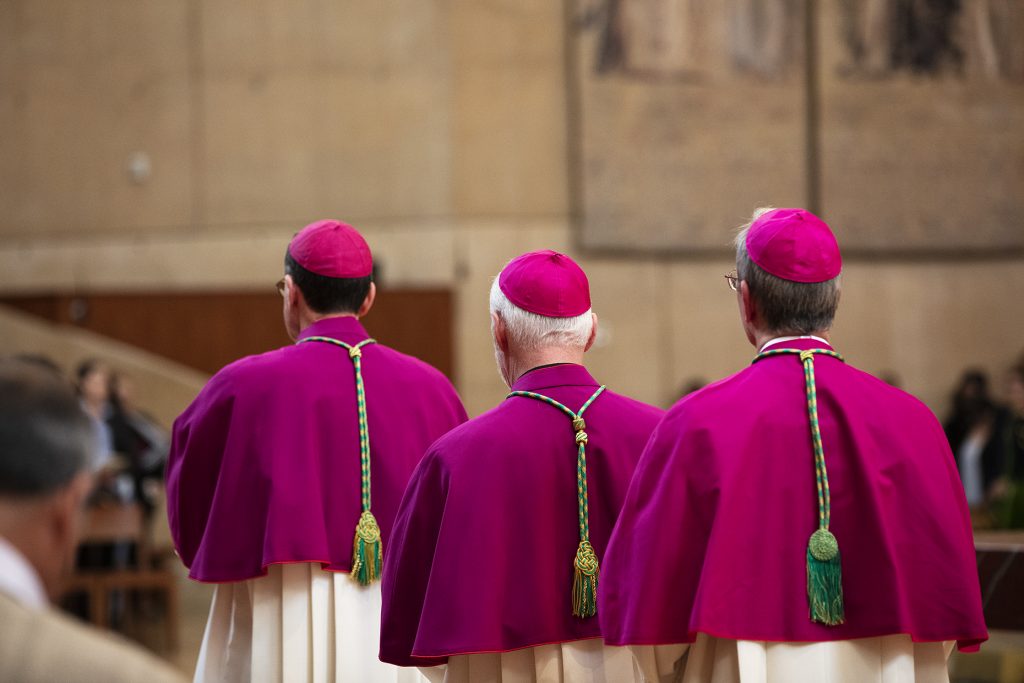The image of the Holy Father, walking alone, issuing the “urbi et orbi” blessing two weeks ago, hit home for Bishop Alex Aclan. “The plaza behind him that is usually filled with people completely empty; rain pouring down copiously like tears from heaven — a fitting image of how a lot of us are feeling at the moment. Alone. Isolated. Dejected.”
Like priests around the world, Bishop Aclan is preparing to celebrate the holiest days in the Church’s liturgical calendar, but this year, these celebrations will take place in empty churches. “We are navigating terrain that is foreign to us,” said the Filipino-born prelate, who serves in the Archdiocese's San Fernando Pastoral Region.
But Aclan takes comfort in the fact that “Jesus can relate with how we are feeling. “In this time of separation, segregation, remoteness, and loneliness, we can keep our eyes focused on the crucified Jesus, and unite our experiences with his.”
His brother bishops in Los Angeles also shared messages of faith. “We are walking through the valley of the shadow of death. The world has become the valley of darkness,” said Bishop Edward Clark of the Our Lady of the Angels Pastoral Region. “But where there is faith, there is hope.
“We have faith in the skill and dedication of medical researchers, and of the doctors and nurses who care for us.” And just as these people work to take care of our bodies, “we have faith that God walks with us to protect our souls,” he said.
These first responders are like Simon, who eased the burden of Jesus as he carried his cross, Bishop Marc V. Trudeau of the San Pedro Pastoral Region reflected. In his Scriptural Stations of the Cross for Health Care Workers and First Responders, he thanked the “caregivers, first responders, nurses, and doctors who journey with victims of COVID-19, easing their pain and suffering “so that they might find the pathway to health.”
In a recent article, Bishop Robert Barron, auxiliary of Santa Barbara Pastorial Region, reflected on the tragedies his region has withstood in the past two years — the Thomas Fire, the deadly mudslide that followed, the Borderline shooting in Thousand Oaks, a tragic boat fire, and now, COVID-19. “All of these tragedies are but dramatic examples of a general truth about the nature of things,” he said. “Everything in our experience is unstable; it comes into being and it passes out of being.”
But this truth shouldn’t lead us to despair, he continued. Pointing to St. Thomas Aquinas, Bishop Barron said that in the absence of a “cause,” we must turn to God. “When we are shaken, we seek by a very healthy instinct for that which is ultimately stable.”
“At the end of World War II and in the wake of September 11,” Bishop Barron recalled, “churches were filled across our country, and I would be willing to bet, when the coronavirus passes, they will be filled again.”
On Easter, “we proclaim the empty tomb of Christ, who saves us from every disaster, crisis, plague, fear, and doubt. The victory has already been won,” Bishop Trudeau said. “We await its grace to flow over us.” He offers prayers for patience, in a time when the crisis seems never-ending.
“Follow the instructions, maintain a social distance, isolate oneself, frequently wash our hands,” Bishop Clark reminded his parishioners. But his instructions go beyond physical precautions. “Support and care for one another. And pray — pray that we will sustain our hope. Pray that we will hold fast to God, for God will never let go of us.”
Reflecting on the pope’s recent “urbi et orbi” blessing,” when he said this is a “time of choosing...a time to choose what matters and what passess away,” Bishop Aclan said that “what matters is having a deep personal relationship with God. Let us choose to use the time that we suddenly have more of to cultivate that — pray the rosary, read the Gospels, make an act of spiritual communion.”
As we enter into the passion, death, and resurrection of Our Lord, Bishop Aclan encouraged Catholics to “do anything and everything that will make us feel God’s closeness to us.”

